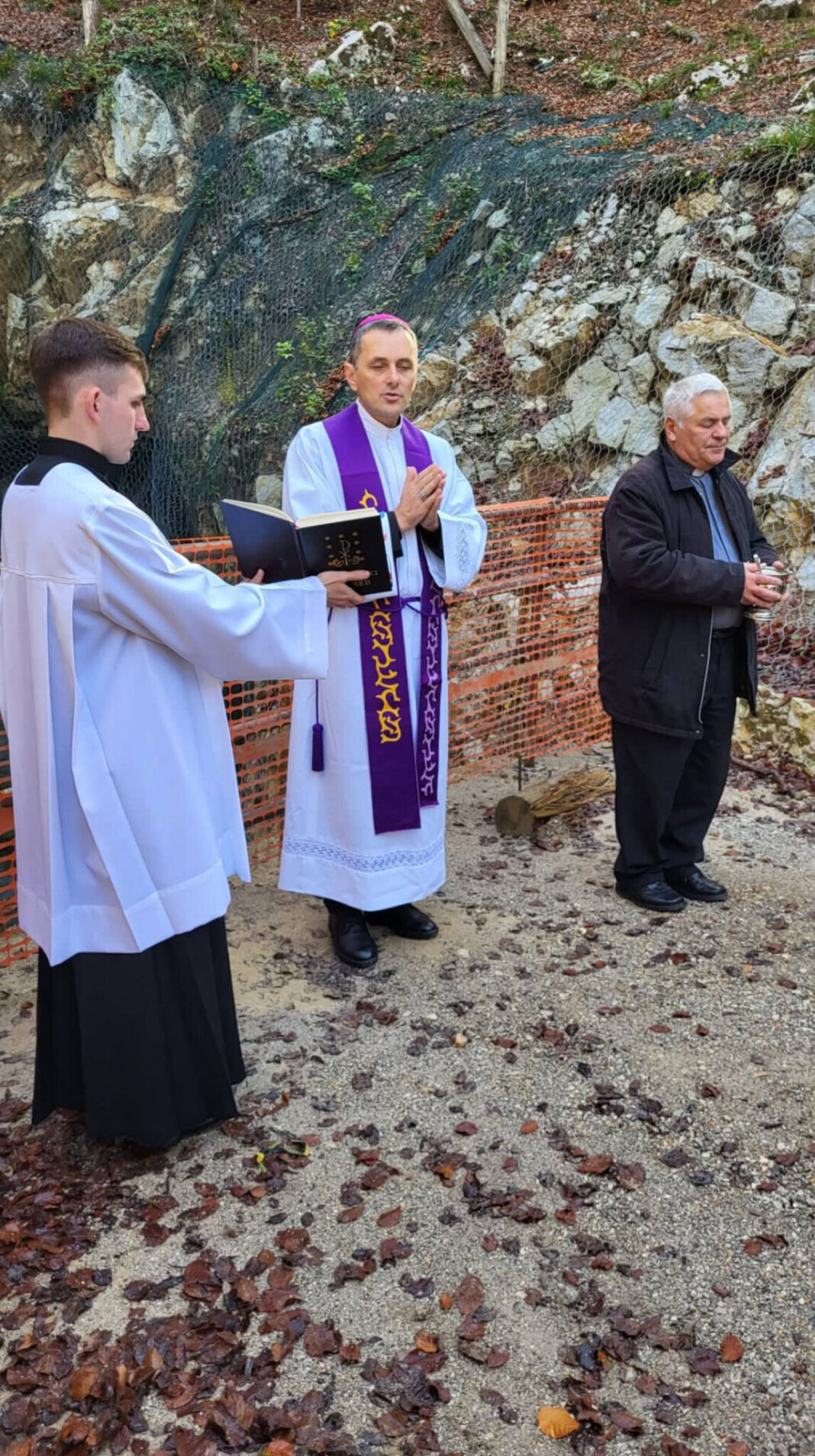By: C. R. / Nova 24TV
Before All Saints’ Day, they gathered in the Kočevje church for a holy mass for the victims killed after the Second World War in the abyss below Macesnova Gorica in Kočevski Rog. The Holy Mass was led by Msgr. Dr Andrej Saje, president of the Slovenian Bishops’ Conference (SŠK) and bishop of Novo mesto.
They paid their respects to more than 3,200 victims murdered after 1945 under Macesnova Gorica in Kočevski Rog, and the archbishop also blessed the site of the murder.
Let’s remember. In the past months, archaeologists have excavated around 3,200 remains of Slovenian men and boys who were brought here in June 1945 from the camp in Škofovi zavodi in Šentvid above Ljubljana and were brutally killed in the forests of Kočevski Rog. In his address, Msgr. Dr Andrej Saje emphasised: “We will pray for them and for all other victims of violence who rest in Slovenian soil with a request for reconciliation and peace and a sincere wish that something like this would never happen again. Many of those killed were clutching a rosary or the shrine of the Brezjanska Mother of God, which is a sign that they lived in Christian hope and in living faith in God until the end.”
Dr Saje also emphasised that during the Second World War and the revolution, Slovenian Christians defied the oppression of the occupiers and the fratricidal terror of their compatriots. Many were brutally murdered during and after the war. Most of the brothers and sisters we remember went through the calvary of Kočevski Rog, Šentvid nad Ljubljano, Teharij pri Celju, Hude jame (Barbara rov in the municipality of Laško) and many other chasms and trenches that opened up to their tortured bodies.
Most died with a prayer on their lips and in their hearts with love for God and their neighbour, even for their oppressors and executioners. Their strength was given by their living faith in Christ’s resurrection. They valued truth and justice more than their own lives, so they stood up to unjust violence and – just like Ukrainians today – to defend their home and family. He also emphasised that, unfortunately, there has not yet been a formal condemnation of all three totalitarian systems and their violence at the national level in Slovenia. Physical killings during and after the war were followed by defamation of the good name of those killed. The doubt was unjustifiably sown among the people that they must have done something bad if they were murdered. “We note with regret that this type of propaganda and malicious rumours did not stop until today,” said the bishop of Novo mesto.
No proven guilt
Violence against innocent victims, who have not been proven guilty, continues even today, as they are not allowed to be buried in graves close to their relatives. The right to a grave is a fundamental human right and represents the true value of the universal human ethos. “It is our human duty to bury the dead and show them respect. The right to a grave derives from the inalienable dignity of every human being. Preventing the respectful burial of those brutally killed is a crime against humanity and represents disrespect for the fundamental norms of civilisation. What kind of country and society are we if individuals can allow themselves to prohibit the burial of innocent victims, among whom are the murdered Roma or other of our compatriots, buried in Kočevski Rog and other murder sites around Slovenia?”
“The burial of the dead in graves has been one of the peculiarities of the human race since its beginning. There will be no peace in our nation and no overcoming of destructive divisions until we overcome the ideological interpretations of the past, reach a consensus on historical facts and respectfully bury all our people,” emphasised the bishop of Novo mesto.
Victim rehabilitation begins with proper identification
We are bound by the Resolution of the European Parliament European Consciousness and Totalitarianism and the Declaration of the Slovenian Academy of Sciences and Arts on Reconciliation. The latter represents an important step towards national reconciliation and condemnation of all crimes. Important steps in the rehabilitation of the victims are the proper identification of the exhumed, their burial either in local cemeteries or in a decent place in the centre of Ljubljana, and the correction of injustices that have not yet been resolved. Dr Andrej Saje thanked the President of the country, Borut Pahor, for his committed efforts and sincere search for a path to national reconciliation. “We wish that such efforts would be strengthened in the future.”
“I invite everyone to reflect on the blessings and live them in our lives and in our mutual relationships, and through faith in God we are the building blocks of truth, peace and justice,” concluded Dr Saje.

